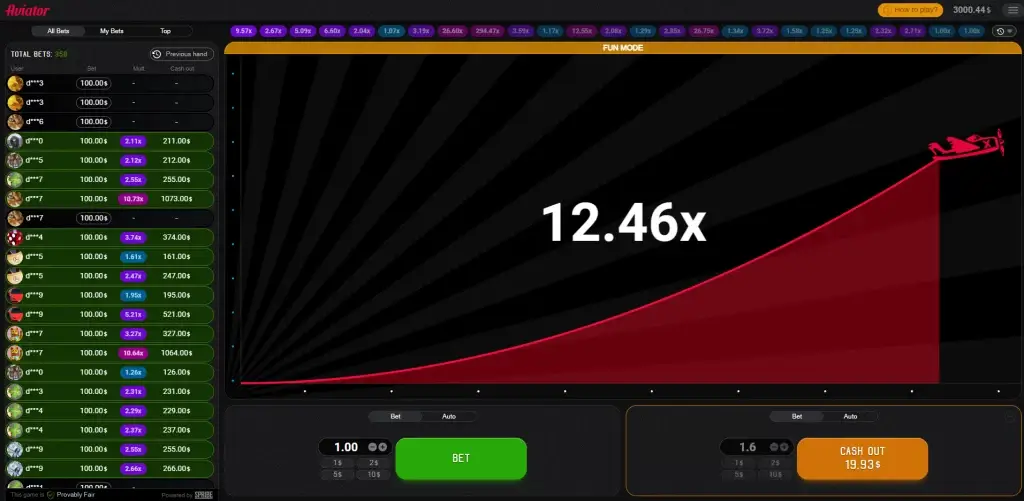Content:
The coefficient in the game Aviator is a numerical value that shows how many times your bet will increase if you win. It is calculated in real-time and can grow until the game ends. This growing coefficient adds excitement and dynamism to each round of the game.
For players interested in how to calculate the coefficient in Aviator, the main attention should be paid to the graph displaying the current coefficient. The graph starts with a coefficient of 1x and can grow to any value before the game ends.
From a mathematical point of view, the coefficient in Aviator has no upper limit. However, players should be cautious as the higher the coefficient, the greater the risk of its sudden drop.
For newcomers, it is important to understand that the Aviator game is based on probability and randomness. While the coefficient can grow very high in one round, in another it may stop almost immediately after the start.
Understanding the mechanics of coefficients in Aviator and their impact on potential winnings can help players develop a strategy and determine the best time to place a bet or take their winnings.
24 Casinos to Play Aviator
Choosing the right casino to play Aviator is a key aspect that can significantly affect your experience and the final result. The casino rating is designed to help players find reliable and honest sites.
Why do the coefficients in Aviator constantly change?
The coefficients in Aviator are dynamic and are calculated in real-time based on an algorithm designed to add randomness and unpredictability to the game. This variability makes each round unique and exciting.
The main reason for the constant change in Aviator’s coefficients is to make the game more interesting and thrilling. If the coefficients were constant, players could easily predict the outcome, and therefore, the game would lose its intrigue.
It also adds an element of strategy to the game. Players must decide whether to take a risk and wait for a higher coefficient or take their bet at an earlier stage.
- Algorithms and random numbers: The basis for the dynamic coefficients in Aviator.
- Excitement and risk: The main factors that make the change in coefficients so captivating.
- Aviator coefficient predictor: Some platforms offer tools for analyzing and predicting coefficients.
- Strategy versus intuition: Some players prefer to rely on their instincts, while others follow strict strategies.
The dynamism of coefficients in Aviator is what makes the game so exciting. It offers players not only the chance to win a significant amount of money but also the thrill of taking risks and experiencing excitement.
Strategies for Choosing Coefficients in Aviator
When it comes to determining the best moment for a bet, many beginners wonder “How to know the coefficient in Aviator?”. In fact, to track the current coefficient, you need to monitor the dynamics of the graph in real-time during the game. This graph demonstrates the growth of the coefficient from the start of the round, and by analyzing it, players can make timely decisions about bets. However, in addition to simple observation, experienced players also consider the history of previous rounds to better understand trends and possible changes.
In the game Aviator, where coefficients play a key role, choosing the right strategy can significantly increase your chances of success. Thanks to the dynamic nature of the game, many players develop their own methods and approaches to managing coefficients to maximize potential winnings.
Some players rely on the Aviator coefficient predictor or various tools and programs designed to predict the likely behavior of the coefficient. Although such tools can be helpful, it is important to understand that Aviator is based on randomness, and there is no absolute guarantee of the accuracy of such forecasts.
Other players follow the Aviator coefficients strategy, basing their decisions on previous coefficient behavior and statistical analysis. For example, if the coefficient has dropped sharply in the last few rounds, a player may decide to bet on a lower coefficient in the next round, expecting a correction.
| Strategy | Description | Risks | Potential Winnings |
| Forecasting | Relying on Aviator forecasts and prediction tools. | High | High |
| Statistical Analysis | Analyze previous rounds to identify possible patterns. | Medium | Medium |
| Intuitive Choice | Make decisions based on personal feelings and intuition. | Medium | Variable |
| Conservative Strategy | Bet on low coefficients to minimize risk. | Low | Low |
| Aggressive Strategy | Wait for high coefficients to maximize winnings. | High | High |
The choice of strategy depends on your style of play, preferences, and appetite for risk. It’s important to remember that in games of chance there is no universal recipe for success, and you should always play responsibly.
How Odds Affect Winnings in Aviator?
The odds in Aviator directly influence the potential winnings. Higher odds can lead to a substantial win, but the risks also increase. This makes the game of Aviator both attractive and risky at the same time.
Understanding how to determine the Aviator odds and how they work can help players make informed decisions. If the odds reach a certain value, a player might decide to cash out their bet, accepting the current odds as a multiplier for their stake. On the other hand, if a player decides to wait and the odds suddenly drop, this could result in losing the bet.
Thus, the odds serve a dual purpose. They provide an opportunity for significant wins, but also add an element of risk. This gives the game of Aviator an additional level of complexity and strategy.
For many players, especially newcomers, understanding the odds in Aviator is key. It’s important to start with the basics and then gradually build up experience. By mastering various strategies and analyzing the dynamics of Aviator odds, players can gain valuable experience and improve their skills in the game.
Risk Management through Odds
In the game of Aviator, where the odds fluctuate up and down, risk management becomes a key strategy for ensuring sustained success. Players who have learned to balance the opportunity for a significant win against the loss of their stake often achieve the best results.
Risk management involves making decisions based on the probability of loss and potential gain. Instead of always going for the maximum and risking it all, wise players use Aviator forecasts and their intuition to determine the best time to cash out their winnings.
The primary advantage of Aviator odds is that they provide players with direct control over their risks. Instead of relying solely on luck, players can use odds as a tool to manage their stakes and potential winnings.
Odds also offer the opportunity for strategic gameplay. By deciding at what level to cash out their bet, players can determine the level of risk they are comfortable with and adapt their actions accordingly.
- Use Tools: Rely on tools and Aviator coefficient predictors to forecast possible coefficient behavior.
- Set Limits: Determine in advance at what coefficient level you want to cash out your winnings or stop playing.
- Adapt Strategy: If the coefficients continue to fall, consider revising your strategy and making more conservative bets.
Risk Management through coefficients requires not only knowledge but also discipline. Your ability to monitor trends, understand risks, and act strategically will define your success in the Aviator game.
Rules and Features of Coefficients in Aviator
Aviator is a dynamic game, and its rules and features related to coefficients make it unique among other luck-based games. While the basic rules are simple and easily understood, there are nuances to consider when playing.
The first thing to know is how coefficients are formed and change during the game. Everything depends on a random algorithm, and although Aviator forecasts can give a general idea, no tools or strategies can guarantee an accurate prediction.
- Start of the Game: Each round begins with a coefficient of 1.0, which starts to rise until the game ends.
- End of the Round: The round ends at a random moment in time, and the coefficient at that moment becomes the final multiplier for the players’ bets.
- Players’ Bets: Players can place bets at any time before the start of the round. However, once the round starts, bets are locked in.
- Wins and Losses: If a player decides to cash out before the end of the round, their bet is multiplied by the current coefficient. If the player does not do so, they lose their bet.
The feature of Aviator coefficients is that they add an element of strategy and risk to the game. Players must constantly make decisions based on the current coefficient, their strategy, and their comfort level with risk.
The Aviator game coefficient combines elements of luck, strategy, and unpredictability, making each round exciting and unique. Success in the game depends on a combination of knowledge, intuition, and risk management.
FAQ
What is the coefficient in the Aviator game?
The coefficient in the Aviator game is a numerical value showing how many times your bet will increase if you win. This is a dynamically changing number that grows in real time and determines your potential winnings.
Is it possible to predict the coefficient in Aviator?
Although there are various tools and programs that offer Aviator odds predictor, it should be understood that the game is based on chance. These tools may provide some insight or guesswork about odds, but there is no absolute guarantee that such forecasts will be accurate.
What is the best strategy for maximizing your winnings in Aviator?
While many players develop their strategies based on previous odds behavior and statistical analysis, there is no “one right approach.” It is important to gain experience, study the dynamics of the game and make decisions based on your own observations and risks.
Are there any promotional codes or bonuses for new players in Aviator?
Yes, there are various promotional codes for new players. For example, using the promo code BWLUCK23, you can get 130% on your first deposit.
How often do coefficients change in a game?
The coefficients in Aviator change in each round of the game. They grow in real time, starting at 1x, and can continue to grow until the round ends or the player decides to withdraw their winnings. It is impossible to determine exactly when and at what value the coefficient will stop.



































